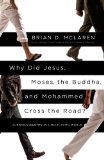 Why Did Jesus, Moses, the Buddha, and Mohammed Cross the Road?
Why Did Jesus, Moses, the Buddha, and Mohammed Cross the Road?
Christian Identity in a Multi-faith World
by Brian D. McLaren
Jericho Books, New York, 2012. 276 pages.
Starred Review
2013 Sonderbooks Stand-out: #8 Nonfiction
This is an important book for Christians to read if they want to interact with today’s society. (If they want to just hide out apart from the world, then they shouldn’t bother.) I like the questions Brian McLaren poses, and I like the thoughtful and thought-provoking answers he gives.
At the beginning of the book, he talks about the identity problem Christians have:
Simply put, we Christians already know how to do two things very well. First, some of us know how to have a strong Christian identity that responds negatively toward other religions. The stronger our Christian commitment, the stronger our aversion or opposition to other religions. The stronger our Christian commitment, the more we emphasize our differences with other faiths and the more we frame those differences in terms of good/evil, right/wrong, and better/worse. We may be friendly to individuals of other religions, but our friendship always has a pretext: we want them to switch sides and be won over to our better way. We love them (or say that we do) in spite of their religious identity, hoping that they will see the light and abandon who they have been to find shelter under the tent of who we are.
Alternatively, others of us know how to have a more positive, accepting response to other religions. We never proselytize. We always show respect for other religions and their adherents. We always minimize differences and maximize commonalities. But we typically achieve coexistence by weakening our Christian identity. We make it matter less that they are Muslim or Hindu by making it matter less that we are Christian. We might even say that we love them in spite of our own religious identity.
For reasons that will become clear in the pages ahead, I’m convinced that neither of these responses is good enough for today’s world. So I will explore the possibility of a third option, a Christian identity that is both strong and kind. By strong I mean vigorous, vital, durable, motivating, faithful, attractive, and defining — an authentic Christian identity that matters. By kind I mean something far more robust than mere tolerance, political correctness, or coexistence: I mean benevolent, hospitable, accepting, interested, and loving, so that the stronger our Christian faith, the more goodwill we will feel and show toward those of other faiths, seeking to understand and appreciate their religion from their point of view. My pursuit, not just in this book but in my life, is a Christian identity that moves me toward people of other faiths in wholehearted love, not in spite of their non-Christian identity and not in spite of my own Christian identity, but because of my identity as a follower of God in the way of Jesus.
This book explores those ideas in detail, and lays out what a strong benevolent identity can mean for our doctrine and our liturgy and our sense of mission.
I read this book over a long period of time. (I kept having to turn it in because it had holds.) I think I’m going to buy myself a copy and read it over again, because there’s much in here that I want to absorb more fully.
This is well worth reading. And if you disagree, it would be worth analyzing why you disagree. How do you think Christians should interact with today’s multi-faith world?
brianmclaren.net
jerichobooks.com
Find this review on Sonderbooks at: www.sonderbooks.com/Nonfiction/why_did_jesus.html
Disclosure: I am an Amazon Affiliate, and will earn a small percentage if you order a book on Amazon after clicking through from my site.
Source: This review is based on a library book from Fairfax County Public Library.
Disclaimer: I am a professional librarian, but I maintain my website and blogs on my own time. The views expressed are solely my own, and in no way represent the official views of my employer or of any committee or group of which I am part.